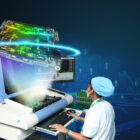The Fourth Industrial Revolution envisions a world where virtual and physical production systems flexibly collaborate with extent features. However, the Fourth Industrial Revolution is more than just smart and networked machinery and systems. Its versatility is very wide-ranging. Waves of new advances are cooccurring in fields ranging from gene sequencing to nanotechnology, renewable energies to quantum computing. The Fourth Industrial Revolution is fundamentally different from past revolutions due to the convergence of these technologies and their interplay across physical, digital, and biological realms.
What is Industry 4.0?
Industry 4.0 refers to the fourth industrial revolution, which involves the digitization and automation of manufacturing and allied activities. We are in the midst of a profound revolution in how products are conceptualized, designed and manufactured, which is inextricably linked to the future of the Internet of Things (IoT).
Networking, machine learning, data analytics, robotics, 3D printing, and other technological advancements are vastly improving industrial processes and diminishing our reliance on human labour and decision-making. By embracing digital solutions, manufacturing can eliminate human error, shorten the time to market, and adapt faster to the latest information.
What technologies are driving industry 4.0?
We know it’s all about digitization and automated value chain operations in various industries. Let us briefly walk through some of the most critical topics you should be aware of.
● Big data analytics takes into account the Internet of Things (IoT). This entails collecting a lot of real-time data. This information can be obtained through resource planning, production line data, customer relationship management, supply chain data, and delivery processes for many industries. This is critical to Industry 4.0 since it offers real-time analytics insights that can be used to make smarter decisions.
● Autonomous machinery, including programming, assembly, testing, inventory logistics and delivery, are all made more accessible by autonomous technology and require less human involvement. Both the technology and the usability of software are rapidly advancing. Robots, for instance, will automatically generate the control software based on operator input. Avoiding car collisions and maintaining lanes are two examples found in consumer items.
● Augmented and virtual reality leverage computer science, technologies that merge the physical and digital worlds and enhance users’ and consumers’ visual experiences by producing immersive experiences.
● Cloud computing is the digital transformation’s “key enabler” for Industry 4.0. The capabilities of modern cloud computing extend far beyond scalability, cost-effectiveness, and speed. It lays the groundwork for the most cutting-edge technologies, from artificial intelligence and machine learning to the Internet of Things, and it gives companies the tools to innovate. The cyberphysical systems at the heart of Industry 4.0 use the cloud for communication and coordination. The data that powers these technologies are stored there.
How can Industry 4.0 increase productivity?
When it comes to manufacturing, Industry 4.0 implies the use of equipment sensors, controls, and other digitally aware devices. These devices are then networked, sharing data to prompt automated changes within production and give executives insights into digital decision-making and analytics. Businesses are seeing more of the shop floor, spotting process bottlenecks and controlling operations
more quickly. Thus, smart factories can transform inflexible production lines into flexible manufacturing cells, allowing them to move from mass production to mass customization. Intelligence is frequently driven by the vertical integration of sensor and machine data into a horizontal business process. This IT/OT convergence enables increased automation of manufacturing processes. The suitable materials are delivered directly from the warehouse to each manufacturing station in response to machine-triggered demand signals. In-line Artificial intelligence-based visual quality inspections are used by manufacturing businesses to quickly discover faults early in the production process at a cheaper cost with fewer human errors. This drives productivity up and enhances quality through industry 4.0.
What does the future hold?
Manufacturing is not the first industry to be affected by digital disruption. The sector has always been at the forefront of innovation, from Industry 4.0 technologies like AI, Big Data, IoT, and others to legacy manufacturing solutions. This sparked a new industrial revolution in the manufacturing sector. Manufacturers must industrialize their data to make it a primary asset for providing better products and customer service if they want to grasp the full potential of this industrial revolution. This facilitates navigating complicated corporate
conditions and ushers in a future that was never anticipated. The fourth industrial revolution, or “Industry 4.0,” is the direction of smart production, where machines would link and interact without human involvement. This makes it possible for the industrial processes
related to production, engineering, the use of materials, asset performance and management, and supply chain and lifecycle management to progress fundamentally.
Evolute’s vision toward the 4.0
The fourth industrial revolution has already started, and embracing new disruptive technology has several advantages for the current industry. AT & T and Google are among the tech companies exploring Industry 4.0 solutions to embrace the transformation that appears to be promising for the industry. Covering the key IT elements of Industry 4.0 will allow one to increase the value of their manufacturing business and reach new heights.
Evolute Technologies embraces and harnesses new technologies and offers solutions that are compliant with TQM, ISO and international standards, IIoT, automation, M2M communication, ERP systems, Agile & Lean processes & cloud data for IoT and IIoT; software consultancy, development, testing, and deployment are available. We also provide CleanTech, FinTech and Industrial Electronics which enable the growth of Indian services.
Our expertise includes customised battery pack assembly with battery management systems for EV/ESS industrial equipment. Electronic manufacturing solutions range from PCBA assembly to complete box build and SW/FW and testing. These solutions are for handheld devices, POS, micro ATMs, Biometric devices and thermal printers for payment and industrial applications.
Evolute’s Electronic Manufacturing Service Capabilities:
Battery Packs Manufacturing
Our D&D capabilities allow us to develop advanced battery management systems which includes with and without communication type of advanced BMS. Capability to test BMS on computerized automated test systems.
In house cells charge and discharge facility for individual cells and higher voltage Li-Ion/LePo4 power packs.
Automated spot weld process done with programmable robotic machines with a plan of installing a fully automated battery pack line.
Surface-Mount Technology (SMT)
Our in-house SMT line is the most modern in its class, with a capacity of 25K CPH and features such as automatic stencil printer, pick-and-place capabilities, automated optical inspection (AOI), automatic reflow, and more. It can handle most complicated assemblies using 0201 and sophisticated 8-layer PCB arrays.
Box Building
Our Box Build Assembly Services include:
• System Level Assembly And testing.
• Software Loading and Product Configuration
• Sub-Level Product Assembly and its testing.
• End Product Assembly, Final Testing and 100% infant mortality test.
• Packaging & Labelling.
• After market Service and Depot Repair of Products.
• Warehousing, Order Fulfilment, and Traceability.
With our box building capability, we’re able to produce a mix of 300k devices per annum of POS, handheld and biometric devices and can quickly expand to 500k devices within 3 months Our team of experts are creating numerous technologies for IoT systems as part of an ongoing effort. These technologies allow us to produce more accessible and inexpensive solutions, creating potential to make the world more inventive and better.
Contact us to discuss your needs, and we’ll be in touch with you shortly to discuss how we can support you with IoT’s innovative technology.





